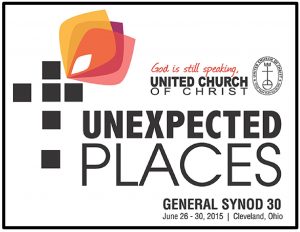 Sermon Text: James 3:13-18 (The Message)
Sermon Text: James 3:13-18 (The Message)
Sermon Excerpt
Last Sunday I shared that our denomination – the United Church of Christ – was in the middle of something called General Synod. Held every two years this national gathering affords an opportunity for many in our tradition to come together in one place for several days of worship, learning, and decision making.
At this General Synod – our thirtieth, held in Cleveland – delegates voted on more than a dozen resolutions. By now you may have heard about some of these. The media has been especially attentive to a few.
Not everything considered passed. Some of the resolutions that did not pass, include
- amendments to the UCC constitution and bylaws that would have shifted leadership of the national setting from the current four-person collegium structure to one general minister and president,
- a call for legislation requiring the labeling of genetically engineered foods as such on packaging, and
- recognizing the actions of Israel against Palestine as apartheid.
These resolutions did not pass because they did not receive the required number of votes. At General Synod a resolution must be affirmed by at least two thirds of the votes in order to pass.
Several resolutions did acquire enough support to pass. Resolutions that passed include some that are not all that controversial:
- joining two denominations in full communion: the United Church of Christ and the United Church of Canada,
- supporting equality by actively dismantling racism (two resolutions: dismantling systems of mass incarceration and dismantling the New Jim Crow), and
- implementing good stewardship of all space, including outer space, by recognizing the need for an outer space environment free of humanly constructed debris.
And some resolutions passed at General Synod have generated a lot of discussion within and beyond our denomination, especially
- requesting that the National Football League team in Washington change their racially demeaning name and mascot, and
- calling for boycotts and divestment from companies that profit from Israel’s occupation of Palestinian lands.
Perhaps as I shared this partial list of resolutions you were considering how you would have voted if you had been present at Synod as a delegate. I won’t tell you exactly how I would have voted, but can assure you if my voice was the only one that counted the results would have been different.
Since many of us here come from a variety of denominations and Christian traditions, I want to be sure that we all recognize the role of the work of General Synod. In other denominations when a national gathering like this happens and decisions are made they are then enforced at the level of local church as new ways of being the church.
In our denomination – the United Church of Christ – the General Synod speaks to not for our local congregations or other settings of the church. In other words, while General Synod resolutions say something to us because we are a covenant people they do not demand our agreement much less our compliance. Our local church has real autonomy.
While some here care a great deal about the national setting of our denomination others have far less interest and some have no interest at all. What we do share in common is a love for and commitment to this expression of church – the Fort Myers Congregational United Church of Christ.
I won’t be asking for your vote this morning, although such a response would be informative and interesting. I will, however, be calling you to think about what it means for us to live well together even to live wisely together as a local congregation while affirming our considerable diversity.
In recent weeks I have encountered a number of strong personal preferences about who we are and who we are becoming as a church. Consider some . . . (read manuscript or watch video)
So What?
Much is happening and much is changing in my local congregation, in my current denomination (the United Church of Christ), and in our world. The same is likely true for you in your context. In the midst of so much change and especially now as we shift from the first to the second half of the year we know as 2015, what do you find to be the most helpful practical counsel for living well and living wisely in your local community of faith? I encourage you to share best practices, hopes and dreams, and unanswered (and perhaps unanswerable) questions. And, of course, feel free to respond to the suggestions in my sermon.